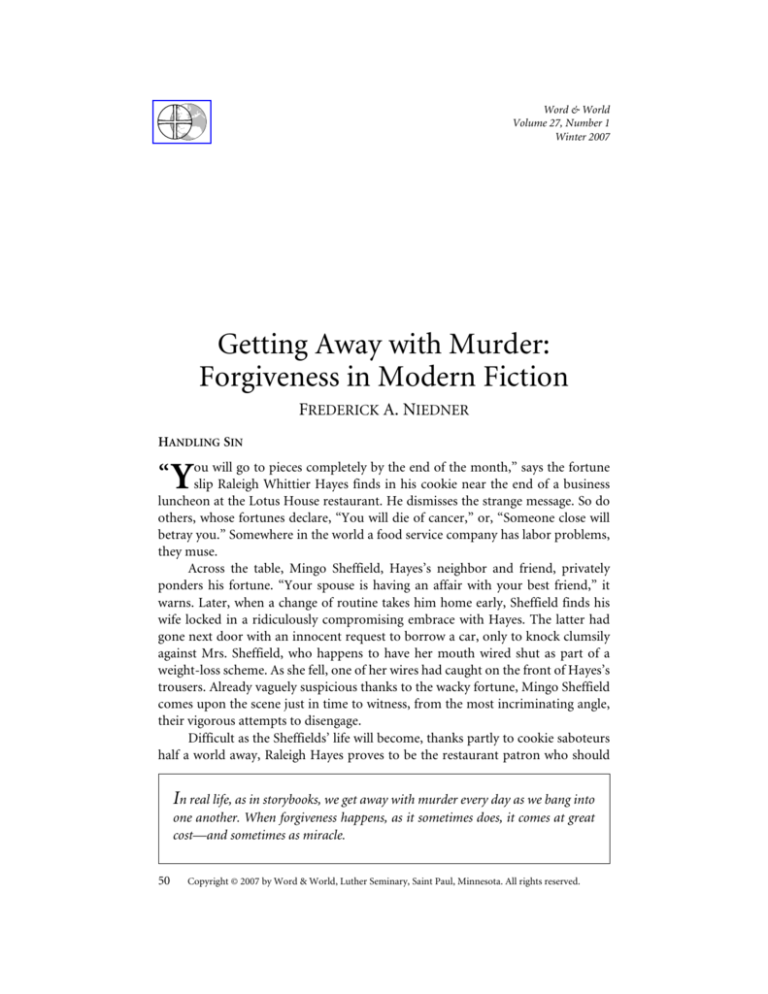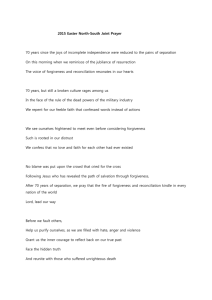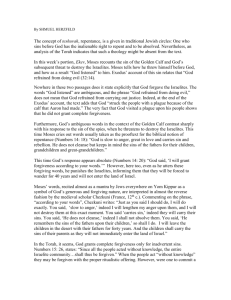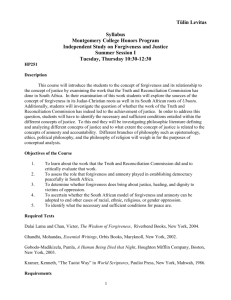
Word & World
Volume 27, Number 1
Winter 2007
Getting Away with Murder:
Forgiveness in Modern Fiction
FREDERICK A. NIEDNER
HANDLING SIN
ou will go to pieces completely by the end of the month,” says the fortune
slip Raleigh Whittier Hayes finds in his cookie near the end of a business
luncheon at the Lotus House restaurant. He dismisses the strange message. So do
others, whose fortunes declare, “You will die of cancer,” or, “Someone close will
betray you.” Somewhere in the world a food service company has labor problems,
they muse.
Across the table, Mingo Sheffield, Hayes’s neighbor and friend, privately
ponders his fortune. “Your spouse is having an affair with your best friend,” it
warns. Later, when a change of routine takes him home early, Sheffield finds his
wife locked in a ridiculously compromising embrace with Hayes. The latter had
gone next door with an innocent request to borrow a car, only to knock clumsily
against Mrs. Sheffield, who happens to have her mouth wired shut as part of a
weight-loss scheme. As she fell, one of her wires had caught on the front of Hayes’s
trousers. Already vaguely suspicious thanks to the wacky fortune, Mingo Sheffield
comes upon the scene just in time to witness, from the most incriminating angle,
their vigorous attempts to disengage.
Difficult as the Sheffields’ life will become, thanks partly to cookie saboteurs
half a world away, Raleigh Hayes proves to be the restaurant patron who should
“
In real life, as in storybooks, we get away with murder every day as we bang into
one another. When forgiveness happens, as it sometimes does, it comes at great
cost—and sometimes as miracle.
50
Copyright © 2007 by Word & World, Luther Seminary, Saint Paul, Minnesota. All rights reserved.
Getting Away with Murder: Forgiveness in Modern Fiction
have heeded his grim fortune. He desperately needs to borrow a car in order to intercept his seventy-something father, a defrocked Episcopal priest who has left the
hospital against medical advice, emptied his bank account, bought a convertible,
and run off with a young hooker. All his life the older Hayes has left a trail of relational mayhem. He has damaged his family and his several parishes through his
vices, only to make things worse when visiting his virtues upon them.
So begins Michael Malone’s Handling Sin,1 the tale of a lurching pilgrimage
toward reconciliation and renewal that begins on the ides of March and climaxes
on Easter Sunday. In borrowing his title from Robert of Brunne’s Handlyng Synne,
a medieval poem about the seven deadly sins and the sacrament of penance,2 Malone hints at the novel’s implicit theology, which pays special attention to the inevitable, but ambiguous, consequences of every human act.
Malone has plenty of practice at writing about sin, having authored several
murder mysteries (Time’s Witness, Uncivil Seasons, First Lady), a novel on academic life (Foolscap), and hundreds of scripts as head writer for ABC’s daytime
drama One Life to Live. If no one yet has, someone should suggest that not even the
devil thinks about sin more creatively than those who create soap opera plots.
Handling Sin offers no sermons or soliloquies on forgiveness. Instead, the
quixotic old priest, who has spread misery along with mercy while administering
the sacraments, symbolizes the church’s general clumsiness at handling sin. Nevertheless, the younger Hayes, with his uncertain faith, still embodies the grace and
promises of the sacraments by which his father had managed, despite both priestly
and fatherly unfaithfulness, to form him.
In the end, generations of accumulated sin and its comically grotesque consequences get left behind in the only way possible—through dying—and Easter’s joy
begins amidst that dying. As his fortune predicted, Raleigh Hayes falls completely
apart, but in the process he regains his life. At the funeral on Easter Monday, in a
familiar, old church, Raleigh notices for the first time how the Christ in the stained
glass above the altar grins at worshipers. He understands at last the novel’s paradoxical point, that “of all the sacraments and of all the sins, the greatest of these is
love.”3
A circumspect gambol through Handling Sin prompts two additional observations. First, every work of fiction, whether literature or pulp, has sin as a major
theme, since every story turns on some element of human brokenness. As Jewish
sages put it, the universe has suffered a deep gash and needs mending. Human beings either help with the mending or ignore the rip and take their chances. Permutations on those two options determine every story’s outcome, fictional or
otherwise.
1Michael
Malone, Handling Sin (Boston: Little, Brown, 1986) chap. 1–3, esp. pp. 3–4.
Oxford Companion to English Literature, 5th ed., ed. Margaret Drabble (Oxford: Oxford University
Press, 1985) 432.
3Malone, Handling Sin, 544.
2The
51
Niedner
A host of significant modern plot lines cry out in vain for the balm of forgiveness. “Killings,”4 the Andre Dubus story filmed as “In the Bedroom,” exemplifies
the emptiness of craving justice while starving for forgiveness. Andre Dubus III’s
House of Sand and Fog5 offers a harrowing glimpse of how easily decent people can
sink into the abyss of murder and suicide for lack of any way to compromise, make
amends, or forfeit their certainty of being right. We witness inexorable waves of
unforgiven, and perhaps unforgivable, sin that wash over whole generations in
William Styron’s Sophie’s Choice,6 Toni Morrison’s Beloved,7 or Allan Gurganus’s
Oldest Living Confederate Widow Tells All.8
Handling Sin’s messy picture of forgiveness suggests a second thesis. Forgiveness, unlike blessings that flow from it, defies description. Even the Scriptures wrap
it in metaphors that range from cleansing to propitiation, to forgetting, to simply
letting go. Sacraments enact forgiveness, say theologians, but precisely how remains a mystery left to poets and storytellers. With apologies for the analogy’s awkwardness, Justice Potter Stewart’s oft misquoted comment about obscenity could
also apply to forgiveness: “I shall not today attempt further to define the kinds of
material I understand to be embraced within that shorthand description; and perhaps I could never succeed in intelligibly doing so. But I know it when I see it.”9
SIN, FORGIVENESS, AND QUESTIONABLE THEOLOGY
In Anne Tyler’s Saint Maybe, the reader witnesses completion of long-sought
atonement, although the moment and means of its fulfillment remain elusive.
Teenager Ian Bedloe wrongly suspects infidelity in his older brother’s wife. Eventually, in a fit of pique, Ian voices his misgivings, and within moments the brother
dies, most likely a suicide. Before long, the brother’s widow sleeps away, thanks to
too many pills, leaving two small children from a previous relationship plus an infant conceived with Ian’s brother.
Only Ian knows of his complicity in these deaths, and family members grant
him little hearing when he tries to confess. His girlfriend listens but pronounces his
anguish silly. When Ian looks for help at a church near his college, the pastor’s
folksy message urges listeners “to be kind to themselves, to take time for themselves
in the midst of the hurly-burly.”10 Ian leaves disappointed, judging himself beyond
the ministrations of a little self-kindness.
One evening, after a shift of work for a moving company—fitting labor for a
modern-day Cain, the original fratricide and wanderer upon the earth—Ian passes
4Andre
Dubus, “Killings,” in Selected Stories (New York: Vintage, 1996) 47–64.
Dubus III, House of Sand and Fog (New York: Vintage, 1999).
6William Styron, Sophie’s Choice (New York: Random House, 1979).
7Toni Morrison, Beloved (New York: Knopf, 1987).
8Allan Gurganus, Oldest Living Confederate Widow Tells All (New York: Knopf, 1989).
9Justice Potter Stewart, U.S. Supreme Court, Jacobellis v. Ohio, 378 U.S. 184 (1964).
10Anne Tyler, Saint Maybe (New York: Ballantine, 1991) 115.
5Andre
52
Getting Away with Murder: Forgiveness in Modern Fiction
a storefront sanctuary whose window declares it “The Church of the Second
Chance.” Sounds of singing draw him in. The prayers make him stay.
“No request is too great, no request is trivial in the eyes of God our Father,”
assured the minister as he invited prayer concerns.11 Ian listened to several others,
then dared to hoist his load onto the hearts of these strangers. “Pray for me to be
forgiven,” he pleaded. “The silence that followed was so deep that Ian felt bathed in
it. He unfolded in it; he gave in to it. He floated on a fluid rush of prayers, and all
the prayers were for his pardon. How could God not listen, then?”12
“Pray for me to be forgiven, he pleaded. The silence that
followed was so deep that Ian felt bathed in it.”
The Church of the Second Chance would become Ian’s family and refuge,
even though that first night’s flood of absolution doesn’t last. When his sins continue to haunt, Ian speaks with the congregation’s eccentric, self-appointed pastor,
who assures him that God most certainly has not forgiven him just because he said
he was sorry. No, one must make reparation for sins, and for Ian that means raising
the children that his careless words have helped to orphan.
Ian complies. He quits college, takes a job, and grows into adulthood as a single parent. Despite the questionable, yet practical and undoubtedly common
theology of reparation that motivates him, the children who embody the weight
of Ian’s sins become both a blessing and the precipitant that slowly transforms
Ian from a self-absorbed adolescent into a man of substance who lives for others—maybe even a saint.
Another chronicle of sin, forgiveness, and questionable theology, in which
moments of absolution take years to have visible effect, weaves through Joyce
Carol Oates’s We Were the Mulvaneys. The prom night acquaintance-rape of their
daughter and sister tears a family’s idyllic life to pieces. Denial, guilt, and vengeful rage turn family members against one another or drive them toward selfdestruction.
Remnants of Christian piety facilitate recovery for some family members but
short-circuit it for others. The assault victim finds relief from pain and shame in
Bible study and prayer. However, these remedies leave her unable to press charges
against her assailant. She’d been drunk and, unable to remember clearly what transpired on prom night, she will not risk bearing false witness.
This leaves her parents and brothers in an unhealthy stew. The parents drift
apart and lose their home. One brother carefully plans to kill the perpetrator, only
to decide when the moment of execution comes that another death will fix nothing. Even while calling down God’s damnation on the rapist, he risks his own life to
save his intended victim from the justice machine he had devised.
11Ibid.,
12Ibid.,
126.
129.
53
Niedner
Years later, another brother’s faithfulness at maintaining contact with the
others brings surviving family members together in a scene of reconciliation. They
recognize, however, that their life as the Mulvaneys lies in the past. Indeed, perhaps
they can only begin again without their old name or place in the community. This
reinforces an earlier clue that it takes more than time to heal some wounds. It takes
a kind of dying.
“I could have let you die and I let you live—remember that,” the brother had
screamed in the face of the rapist as he saved him on the day he meant to kill him.
The narrator notes that both remembered those words for the rest of their lives.13
Regardless of what they meant to the perpetrator, the brother likely remembers
those words for their truthfulness about how his own life, not merely his enemy’s,
got saved that day.
CRASH STORIES
Paul Haggis, whose acclaimed film Crash (Lions Gate Entertainment, 2005)
uses automobile accidents as metaphorical means for probing damaging interactions
and opportunities for redemption as they occur in the chance collision of strangers’
lives, builds on a substantial literary tradition of investigating crash scenes.
Three remarkable works of this kind involve fatal hit-and-run accidents. In
Andre Dubus’s “A Father’s Story,”14 Luke Ripley reacts quickly and instinctively
when his daughter wakes him to say she has hit something or someone while driving along the dark road close to home. He hurries to the scene and finds a young
man lying in the ditch. Luke checks for signs of life, finds none for certain, and returns home. Already, he can name the sins he has piled atop his daughter’s. He
should have summoned an ambulance, or at least called Father Paul, his parish
priest and best friend, to come administer last rites.
Luke then adds to the mound of transgression. Instead of informing authorities, he examines the damage to his daughter’s car and helps her rid it of empty beer
bottles left after a night of partying. Next morning, Luke drives the daughter’s car,
not his own truck, as he goes to daily mass. Near the church, Luke deliberately
smashes the car’s damaged fender into a tree, thereby concealing her crime with his
own.
Luke confesses none of this to Father Paul. Later, however, Luke compares
notes with another Father who habitually handles the sins of his children. That Father did not protect his son from the lash of justice, and Luke believes he would do
likewise—in the case of a son.
Luke feels bound to shield a daughter, however. This suggests, as expressed in
words Luke imagines coming from the other Father, that Luke loves his daughter,
covers her sin, and joins her on the wrong side of the law out of his own weakness,
for he cannot bear to watch her suffer what a son would rightly endure. In the end,
13Joyce
Carol Oates, We Were the Mulvaneys (New York: Dutton, 1996) 304.
Dubus, “A Father’s Story,” in Selected Stories (New York: Random House, 1989) 455–476.
14Andre
54
Getting Away with Murder: Forgiveness in Modern Fiction
Luke directs this same charge at the Father, who loves Luke out of the same sort of
weakness.
This story exposes the gospel’s messiness and scandal. Mercy consistently
trumps justice in the world of a God who boasts a reputation as “gracious and merciful, slow to anger, and abounding in steadfast love, and relents from punishing”
(Joel 2:13). Father Paul works in the same business, continually dismissing sins and
absolving sinners like Luke.
It is left to the local radio station, however, to remember the dead youth in
the ditch. That, too, represents a scandal. Forgiveness among fathers allows one
child to get away with murder, thanks to parental (and Parental) conspiracy become accomplices. Across town, however, grieving cries of another set of parents
go unheard.
The same difficulty haunts Ron Hansen’s Atticus, named for the father in a
midrash on the Lukan parable named for the prodigal son who went off and wasted
his inheritance. In Hansen’s version, the miscreant son has already killed his
mother through careless driving before he ever leaves for Mexico to waste other
things precious to his father. Now word comes that the troubled son has committed suicide.
“Atticus illustrates the lengths to which God goes when
rounding up prodigals, no matter their sins or the sums
they have wasted”
When Atticus goes to collect the body, his amateur sleuthing reveals that the
son hasn’t died, but instead has gone to hell. The body with its face shot off is actually that of another man murdered by thieves and later used by Atticus’s son as a
ruse to fake his own death. If assumed dead, the son cannot be linked to a hit-andrun death he has caused.
This story illustrates the lengths to which God goes when rounding up prodigals, no matter their sins or the sums they have wasted. When Atticus finally comes
face to face with his son, nothing else matters except that his son, who was dead, is
alive. All is forgiven. Never mind that three others lie dead thanks to the son who
gratefully accepts forgiveness.
The prodigal in Atticus doesn’t completely escape justice. He serves a brief
prison sentence before coming home to taste the fatted calf. Moreover, Atticus
finds and “[takes] care of ” the young hit-and-run victim’s family. We can guess
how this wealthy father accomplished such “care.”15 Money cannot restore a life,
but it may help the family drown their sorrows. More to the point, the older
brother who always lingers on the edge of this parable could easily attract allies in
criticizing the prodigal nature of this father’s mercy.
15Ron
Hansen, Atticus (New York: HarperCollins, 1996) 245.
55
Niedner
A third hit-and-run story attends to the scandalous wounds these first two
leave undressed. In Raymond Carver’s “A Small, Good Thing,”16 a car knocks a boy
into the gutter as he walks to school on the morning of his seventh birthday. At first
the child seems all right, and after pausing a distance away, the driver assumes as
much and speeds off when he sees the boy stand up. Later in the day the child collapses. For a week he lingers between life and death.
While splitting time between home and hospital, the parents experience a series of harassing phone calls that include accusations about forgetting their son’s
birthday. After the child dies, the parents finally trace the bizarre telephone messages to the gruff baker from whom the mother had ordered a birthday cake she
never picked up. Filled with pent-up rage, the parents steam off to confront their
persecutor.
Here, too, we have a parable. Everyone in the story behaves typically. Children step where they shouldn’t. The rest of us bang into others—whether in traffic,
business, church meetings, or marriage, check briefly to make sure they’re okay,
and move on. We lose patience with folks who owe us, or have left us holding some
bag—or cake. Sadly, the intersections where these activities cross lie heaped with
brokenness.
This time, however, a miraculous scene transpires at the bakery. The parents
accuse and berate the baker, but astonishingly, the baker soon quits all efforts to
defend or justify himself. Instead, he apologizes, offers condolences, and asks for
forgiveness.
Most importantly, perhaps, he offers lavish hospitality. He clears a space, invites the couple to sit, and provides what a baker has to give—hot sweet-rolls,
warm bread, and butter. “You probably need to eat something,” he says. “You have
to eat and keep going. Eating is a small, good thing in a time like this.”17 Over rolls,
bread, and coffee, the trio shares grief at being childless—one story is old, the other
new. “They talked on into the early morning, the high, pale cast of light in the windows, and they did not think of leaving.”18
Here, too, someone gets away with murder, but this time we forget that person. We grieve instead with the victim’s family, and by extension with the bereft
families in Dubus’s and Hansen’s stories. We eat and drink from a different stream
of forgiveness. We trust that the God who remains so hell-bent on forgiving careless drivers will not only hold their victims close as they die alone in some ditch, but
also has agents out and about to feed the victims’ loved ones with the bread of compassion. If not for all these distinct ministrations, forgiveness remains cheap, the
hope of only one party to humanity’s every collision.
16Raymond Carver, “A Small, Good Thing,” in Where I’m Calling From (New York: Atlantic Monthly Press,
1988) 280–301.
17Ibid., 301.
18Ibid.
56
Getting Away with Murder: Forgiveness in Modern Fiction
A COMPLEX ATONEMENT
Its title alone urges consideration of Ian McEwan’s Atonement.19 Indeed, the
several layers of meaning and astonishing reversals of apparent truth in this agonizing look at attempts to atone for irreparable damage warrant a full and discrete
discussion that this novel cannot receive here.
In the span of a weekend in 1934, thirteen-year-old Briony Tallis, the imaginative, loquacious daughter of British aristocrats, comes to several false conclusions about her older sister’s relationship to the family charwoman’s son. Briony’s
assumptions then lead her to wrongly accuse the sister’s lover when a cousin is
raped on the family estate.
Thanks to Briony’s testimony, the lad goes unjustly to prison and the sister’s
life falls into bitter ruin. With the onset of war, the rest of the world has plunged
into darkness as well. Hence, the charwoman’s son, with few prospects after release
from prison, becomes a soldier. Eventually, readers join him on the dreadful retreat from Dunkirk to the sea and witness the damage both prison and war have
wrought on him.
Briony, meanwhile, comes to recognize her tenuous grasp on truth and wrestles with the probability that she has destroyed others’ lives. She first seeks atonement by abandoning literary pursuits to become a nurse. If she can’t save her
sister’s banished lover, perhaps she can minister to others like him. Briony serves
ably, healing the dreams, if not the bodies, of dying soldiers through her multiple
skills.
“no human being can author a reconciling story that
doesn’t itself require the mercy of forgiveness”
Eventually Briony concludes that she cannot make atonement solely through
her own sacrifice. She vows to devote her life to truth-telling, and to that end she
begins again to write. Through literary skill and the salutary use of imagination she
seeks to redeem the lives her youthful zeal had left in tatters.
The layers of surprise at the close of the novel suggest at least two theses about
truth and atonement. First, necessary as such narratives may be, no human being
can author a reconciling story that doesn’t itself require the mercy of forgiveness.
A second claim lies partly hidden in the acknowledgments so curiously placed
at the end of this novel. These expressions suggest that whoever gets the last word
in a story that attempts atonement must make it a word that acknowledges debt to
others’ capacity for remembering, and must also make it a word that expresses
gratitude to close readers, especially those who can see its flaws.20
19Ian
McEwan, Atonement (New York: N. A. Talese/Doubleday, 2001).
20For this reading of Atonement, I am indebted to my colleague Mark Schwehn, whose hitherto unpublished
treatment of this remarkable novel must some day find its way into print.
57
Niedner
FORGIVENESS AND PAIN
Sue Miller’s While I Was Gone21 shows us that even when truth is plainly
known and told, the story and its teller don’t always succeed at putting things right.
The narrator, Jo Becker, has a loving husband, three daughters on the cusp of
adulthood, and a successful veterinary practice. She also has a past most anyone
would hope to forget.
Jo had married young, soon tired of marriage, and rather than filing for divorce had simply run away, eventually starting a new life under an assumed name
in a 1960s-style urban commune. That period of her life ended amidst events surrounding the unsolved murder of a female friend and fellow-resident.
Jo’s second husband, Daniel, a winsome parish pastor, along with her daily
sojourn in the uncomplicated world of animals, have granted her a peaceful equilibrium that has withstood even the emotional onslaughts of adolescent daughters.
All of that changes when Eli Mayhew, whom Jo recalls as the most handsome
male among the old commune members, becomes a new veterinary client. Old curiosities rekindle in Jo, and when Eli invites her to meet him for an evening without
their spouses, Jo prepares for a tryst.
Instead of the dalliance she imagines, Jo finds herself in a confessional booth
as Eli blurts out the story of how and why he killed their housemate. Although he
believes that his tireless work in medical research has atoned for the life he took, Eli
apparently cannot successfully forgive himself. He needs a word of absolution, or
at least an affirmation of his atoning work.
Jo can provide neither. Later, she shares this encounter with her pastorconfessor husband. She does not, however, intend to divulge what their conversation ultimately reveals, namely, that Jo had gone with adultery in mind to see Eli.
Deeply hurt, Daniel withdraws. Jo, meanwhile, goes to the police, but
authorities cannot prosecute Eli. Ironically, therefore, Eli gets away with murder,
while Jo suffers judgment and alienation over a sin she only imagined.
“Daniel must forgive her, and he does, but not, Jo
realizes, without sadness and pain”
In the end, Jo receives the forgiveness she longs for, one she cannot grant herself. She has learned the truth that Daniel knows through trusting God, who sees
him whole, loves him still, and faithfully forgives him. Jo cannot forgive herself.
Daniel must forgive her, and he does, but not, Jo realizes, without sadness and
pain. He must give something up in order to leap the chasm that’s come between
them. He must let go of being right, with its privileged status as the wronged party.
When he does, they learn again to risk intimacy.
Eli’s haunting presence about town eventually becomes a helpful symbol. Jo
21Sue
58
Miller, While I Was Gone (New York: Ballantine, 1999).
Getting Away with Murder: Forgiveness in Modern Fiction
sees him as a reminder that at any time someone might make us see surprising
things in ourselves, things that reveal how dimly we know ourselves, things that
make each of us need forgiveness.
In real life, as in storybooks, we get away with murder nearly every day as we
bang into one another, head-on or at some angle. Sometimes forgiveness happens,
at other times not. When it does, it comes at great cost. It cannot be forced. Often it
comes as a miracle, though even then we find it messy and sometimes scandalous.
It’s hard to say how it works, or even precisely what it is. But we know it when
we see it, and we’re grateful when we do.
FREDERICK A. NIEDNER teaches biblical studies in Valparaiso University’s department of theol-
ogy, Valparaiso, Indiana. He writes a regular column on matters religious for the northwest Indiana Post-Tribune.
59







